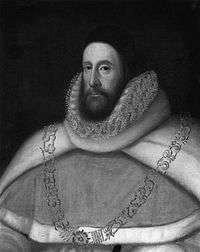Sir Henry Hobart, 1st Baronet
Sir Henry Hobart, 1st Baronet SL (c. 1560 – 29 December 1625), of Blickling Hall, was an English politician who succeeded Sir Edward Coke to become Chief Justice of the Court of Common Pleas.
Sir Henry Hobart | |
|---|---|
%2C_1st_Baronet.jpeg) | |
| Chief Justice of the Common Pleas | |
| In office 1613–1625 | |
| Monarch | James I, Charles I |
| Preceded by | Sir Edward Coke |
| Succeeded by | Sir Thomas Richardson |
| Attorney General for England and Wales | |
| In office 1606–1613 | |
| Monarch | James I |
| Preceded by | Sir Edward Coke |
| Succeeded by | Sir Francis Bacon |
| Personal details | |
| Born | c. 1560 |
| Died | 29 December 1625 (aged 64-65) |
| Spouse(s) | Dorothy Bell |
| Children | 16 |

Background and education
The son of Thomas Hobart and Audrey Hare, and great-grandson of Sir James Hobart of Monks Eleigh, Suffolk, who served as Attorney General during the reign of King Henry VII. He would further this lineal occupation and was admitted to Lincoln's Inn on 10 August 1575, and was later called to the Bar in 1584, and subsequently became governor of Lincoln's Inn in 1591.
Legal and political career
Between 1588 and 1589, Hobart was Member of Parliament (MP) for St Ives, for Great Yarmouth in 1597 and 1601, and for Norwich from 1604 to 1611. He was Steward of Norwich in 1595, made Serjeant from 1603 to 1606, and later served as Attorney for the Court of Wards in 1605 and Attorney General for England and Wales between 1606 and 1613 while Bacon was Solicitor-General. While in that post, they argued Calvin's Case, by which the Rights of Englishmen were bestowed on the postnati Scots.[1] From 1613 to 1625, his abilities were further recognized and he was elevated to Chief Justice of the Court of Common Pleas. Hobart was knighted in 1603 and made Baronet, of Intwood in the County of Norfolk on 11 May 1611. He was respected for his knowledge and sophistication in matters of estate management. He successfully acquired a fair amount of Norfolk property, including the estates of Intwood in 1596 and Blickling in 1616, where he was buried on 4 January 1626 (new calendar).
Family
On 21 April 1590, he married Dorothy Bell, the daughter of Sir Robert Bell, in Blickling, Norfolk. They had twelve sons including John Hobart and four daughters.[2] The following analysis should be regarded as a work in progress as of August 2020:
All four daughters are believed to be identified:
- Dorothea or Dorothy [3] 1592-1624 but LBC suggests alive in 1635. Investigation ongoing
- Philippa [4] Cited as a daughter dates not known but LBC suggests alive in 1635
- Mary Elizabeth 1608-1633
- Frances 1612-1632
11 of the 12 sons are believed to be identified:
- Henry (I) 1591-1609
- John 1593-1647
- Edmund 1594-1607
- Myles 1595-1639
- Thomas (I) 1597-1600
- Nathaniel 1600-1674
- Edward 1601- ? Possibly the Edward who died "beyond the seas" 1627-8 [5]
- James 1603-1643
- Thomas (II) 1605-1633
- Robert 1606-1606
- Henry (II) 1619-1638 Known to be youngest son
One presently unknown; possibly an unnamed infant
See also
References
- State trials at the time, before the Law Lords en banc, had two rounds of arguments, one apiece by Solicitor- then Attorney-General.
- Dictionary of National Biography ed Sir Leslie Stephen 1921-1922 via www.ancestry.co.uk
- Lothian Blickling Collection pdf page 29
- Lothian Blickling Collection pdf page 29
- Lothian Blickling Collection pdf page 29
- Handley, Stuart. "Hobart, Sir Henry, first baronet (c.1554-1625)". Oxford Dictionary of National Biography (online ed.). Oxford University Press. doi:10.1093/ref:odnb/13391. (Subscription or UK public library membership required.)
- John Andrew Hamilton (1891). . In Lee, Sidney (ed.). Dictionary of National Biography. 27. London: Smith, Elder & Co.
- "thePeerage". Retrieved 2 January 2007.
External links
| Wikiquote has quotations related to: Sir Henry Hobart, 1st Baronet |
| Legal offices | ||
|---|---|---|
| Preceded by Sir Edward Coke |
Attorney General for England and Wales 1606–1613 |
Succeeded by Sir Francis Bacon |
| Preceded by Sir Edward Coke |
Chief Justice of the Common Pleas 1613–1625 |
Succeeded by Sir Thomas Richardson |
| Baronetage of England | ||
| New creation | Baronet (of Intwood) 1611–1625 |
Succeeded by John Hobart |